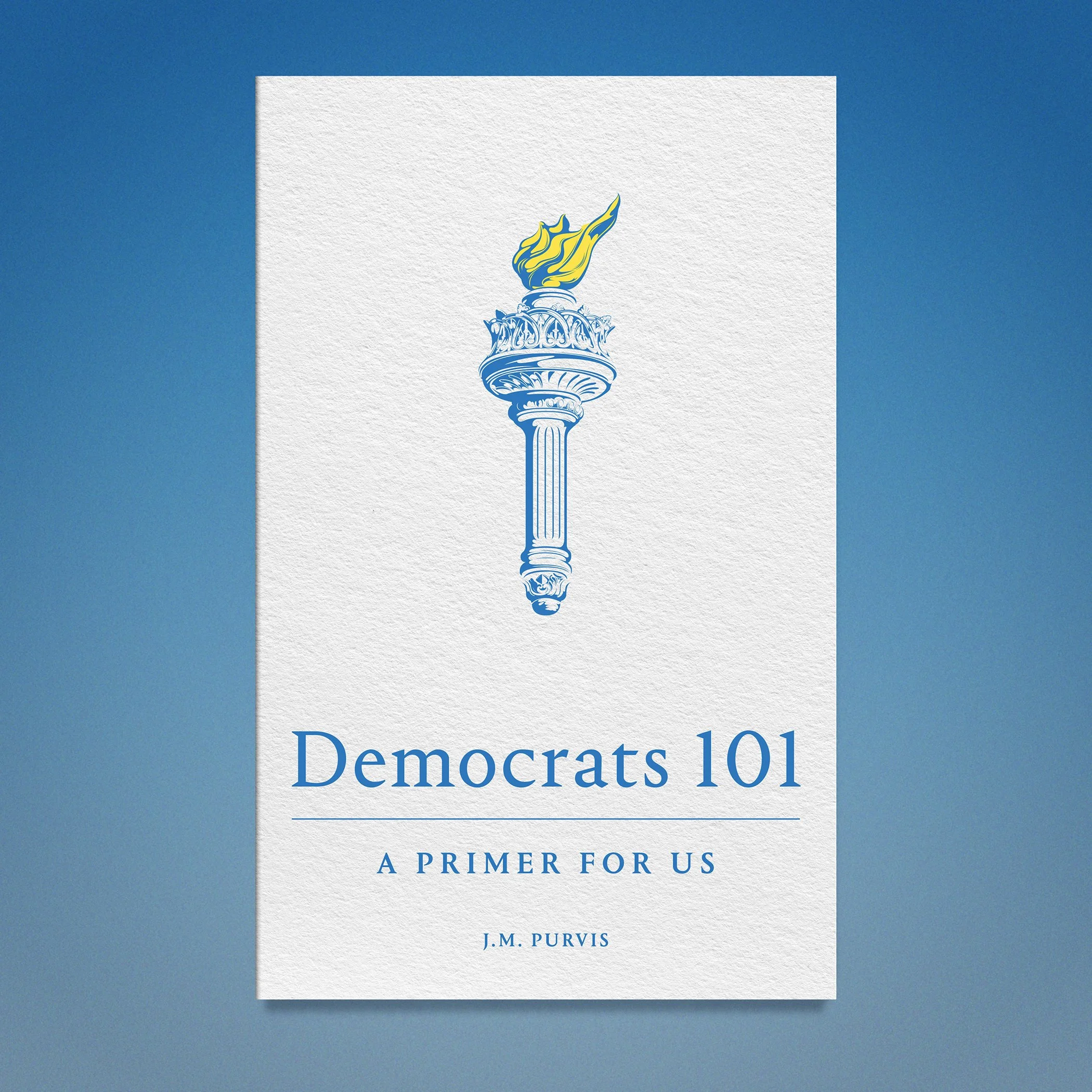Opening Chapter of “Democrats 101” by J.M. Purvis
This is not a traditional book about election campaigns or political positions. It’s not about policies or grand theories. It’s about us, you and me, the real Democratic Party. It’s about our basic values and our long search for identity, and why that is now the most important issue we face.
One person wrote the book you’re about to read, but fellow Democrats from every corner of our tent helped shape its ideas. Each and every one of those people is united by their frustration with our current state of affairs, and their deep conviction that what we do in the coming years matters enormously.
★
The Question: What, exactly, is a Democrat?
You, me, all of us … why do we belong to the same party? What ties us all together … ranchers in Montana and laborers in Miami and single moms in Los Angeles? Who, in fact, are we?
Here’s a better question: Why do we think we know? Why are we all so damn sure we know who we are when we can’t spell it out? You think you can? Try it. Take out a pen and make an actual list: What beliefs define every Democrat in this country? What do we all hold dear, every single one of us, from rural Joe Manchin supporters in West Virginia to fierce Alexandria Ocasio-Cortez backers in the Bronx and everyone in between? If we’re all in the same party, then we must all share some kind of core belief system, and we ought to know what it is. If we don’t, if our plan is to keep on arguing about it endlessly and leave the Republicans to apply the labels, that should scare the hell out of us. Especially now.
Of course, some people would say we’re Democrats because we’re not Republicans. We live in a two-party system in this country, and you do really have to choose one or the other. Even independents and Libertarians have to make that choice in the end. It’s a valid reason to vote Democrat … especially these days … but it isn’t a very good reason to be a Democrat.
Policy damned sure isn’t the reason. If policy was what defined us, the Democratic Party would have disintegrated a long time ago. We have never all agreed on policy, and we never will. Ever. Yet, we seem obsessed with policy as if it were the end-all, the one battle worth having, the very essence of who we are. Health care is a great example. How much time and emotion have we wasted on that issue? How many litmus tests have we created? Medicare for all versus a better Obamacare isn’t about who we are. The idea of health care for everyone? Even that doesn’t define who we are. We support health care for everyone because of who we are. That’s what’s important. It’s what separates us from the Republican Party, and it’s at the heart of what’s been missing in the way we approach things.
Policy is about how to fix things. Issues are about what needs fixing. Our core beliefs are something else entirely. Our core values are not left or right. They can’t be if they’re central to all of us. And they’re not about the issues or events of the moment. As emotional as we may get over these things, words like “moderate” and “progressive” don’t define who we are. They define how we approach policy. They define how we want to get things done. Core beliefs, on the other hand, define us as Democrats, and we need … desperately … to recognize that. If 2016 wasn’t a wake-up call, then the blue wave that didn’t come in 2020 sure ought to be, to say nothing of the right-wing mob that stormed the Capitol.
The Republican Party understands core identity perfectly. Nowadays, being a Republican is a brand. What they’re selling is power and how to hold on to it, control. Their messaging … and their values … is whatever works.
We can’t do that. Our “product” is our beliefs, what we stand for, our basic identity. Failing to understand that … failing to define it … is why so much of our messaging doesn’t work.
We talk endlessly about how diverse we are—the big tent. And it’s true. We can be found in almost every imaginable part of the country. We represent just about every demographic that exists—every age group, every race, you name it. We are everybody, so why the hell does the Republican Party … the bad guys … get away with so much? Why do they get away with selling fake populism when we’re the ones supporting what people actually need? Why do they get away with smearing us and our initiatives … and all we seem to do is go on squabbling? Aren’t you tired of it? Aren’t you frustrated? We all sense that bigger things are at stake, especially now, so why can’t we ever seem to communicate that? Why are we always playing catch-up?
This country was founded on certain ideals, basic principles that were revolutionary at the time. These ideals were implied promises. Those promises were imperfect, to be sure, and they faced huge opposition. And they certainly did not apply to everyone. But they made their mark. Over time, they took hold and evolved, just as surely as the country evolved. Social change is traditionally slow. So is social progress. A good ninety years went by before America managed to abolish slavery. It was another five decades before women gained the right to vote. But the direction of that progress has been inexorable, and with technology on the scene, that progress has begun moving at an ever-increasing rate.
The modern Democratic Party, the one we know as ours, has been an integral part of that basic struggle for social progress. Not always, and often not by so many of us, but at the moments of real progress in this country, it’s always been Democrats who were there. It’s been Democrats who spoke out, and it’s been because of our steadily evolving core values. The basic thread has always been there. It’s been buried in our moral fabric since the very beginning, but for a long time, the social norms of this country wouldn’t allow us to recognize those values as a party. Too many people … too many of us … were still in thrall to the traditions and prejudices of the past.
And that’s exactly why right now … these next few years … is a unique moment in history. Social norms are beginning to catch up to our inherent values. Not everywhere, of course, or Donald Trump wouldn’t have been elected president. But enough, enough to launch huge Black Lives Matter protests across the nation, enough to do a lot of things.
And it’s recent. It’s easy to forget just how new so many of these attitudes are—their extent, their acceptance—and it isn’t just about race. The majority of Americans no longer view gay marriage as an issue, and that’s a historic first. Harvey Weinstein is in jail, and #MeToo is real. More than 60 percent of Americans think the federal government should ensure universal health care.
There has been a seismic shift in the norms of this country. It’s a move toward a deeper realization of those revolutionary ideals America was founded on, and it’s going on everywhere—in the media, in education, and in day-to-day life itself.
But it’s confusing. Age-old truths and traditions are crashing for an awful lot of people. Unsettling issues are springing up in their place, issues … injustices … that so many Americans never had to think about before, things like transgender bathrooms and renaming famous military bases and the idea that racism really is everywhere. It may be crystal clear for some of us, but for an enormous chunk of America, it’s unsettling. And that has spawned wild conspiracy theories, “alternative facts,” and a deluge of more information than anybody can digest. Huge numbers of people don’t quite know what to believe, and it’s not just Republican voters. There’s a growing hunger among an enormous amount of people for values and direction, for someone to make sense of the very new world we seem to be headed into at light speed.
Donald Trump became president by manipulating that vague hunger so many Americans feel. Not understanding that hunger is a big chunk of why Hillary lost, why the 2020 blue wave never came, and if we’re not careful, it’ll be why we lose again. America is in nothing less than the early stages of a vast political upheaval, one that’s going to last decades. Trump is just the tip of the iceberg, a passing facet of what’s playing out. What’s coming in the next twenty years is nothing short of a colossal shift in the way we live and think and vote.
And that’s why we need to do more than just win elections. Our goal is a just society for every American, and to do that, we need our values to prevail. If we want to make sure we never ever have to fight over the concept of basic human rights again, then we have to make sure people understand just what those rights are. They need to understand, and they need to believe.
We don’t accomplish that by toppling our opponents. We accomplish that by including our opponents. Not the haters, not the conspiracy-ranters, but the others … the millions and millions of Americans who aren’t really sure what’s going on. These are the people we need to win over, and we need to do it bit by bit, year by year. And that’s why we need to become the standard-bearers for the kinds of basic values that just ring true. What we need now is a clear statement of our beliefs, something in simple, direct English that rings true to everyone in this country … Black, White, Hispanic, techies and coal miners, everyone … basic values that are truly universal, that can serve as a moral compass as we struggle through all the very complex problems headed our way.
The first step in writing out those beliefs is to take a long, hard look at ourselves. We Democrats carry blame, because the mess we’re in is not an accident. The Tea Party wasn’t an accident. Trump wasn’t an accident. None of it was … none of it is … and we’ve played a part, all of us, from establishment bigwigs down to the most humble voter. The Republican Party may be the villain, but we’ve helped dig the hole we’re in, and we’re not going to get out of it until we face up to exactly what has happened.
As Americans, we have a very short historical memory. If it didn’t happen recently, it can’t be important. Well, in this case, it is. Every bit of what we face today as Democrats is tied directly to our history as a party … every problem, every passion, every possible solution. If we want to fix things, if we truly want to succeed, then we need to understand exactly how we got here.
To read more, buy the book!


